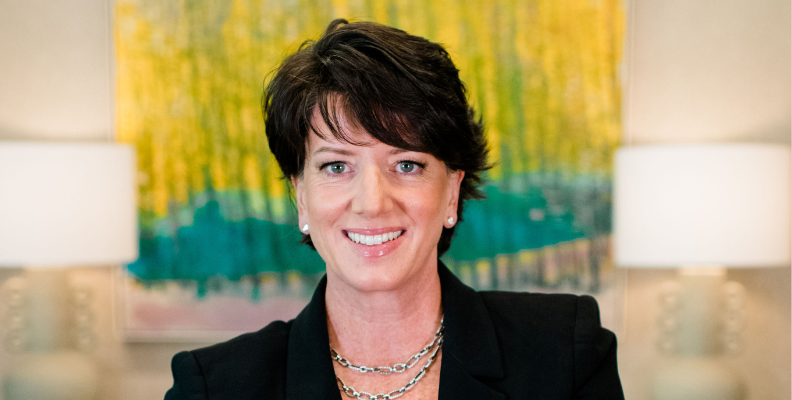
From Corporate Executive to Entrepreneur: What No One Prepares You For
You don’t need to start over to become an entrepreneur. You need to translate what you already know. Here’s how I turned corporate strategy, financial acumen, and leadership experience into a business that scales.
November 13, 2025
From Corporate Executive to Entrepreneur: What No One Prepares You For
“After decades in boardrooms, I thought I was ready to build a business. I wasn’t. The real growth came when I stopped trying to be prepared and started saying yes.” - Jennifer DiMotta
For most of my career, I was trained to climb the ladder. I learned how to manage teams, hit targets, and deliver results quarter after quarter. I could build strategy decks in my sleep and walk into any boardroom with data to back up a decision.
But when I left corporate life, I realized no one had prepared me for what came next—how to turn all that experience into a business of my own.
After 25 years in leadership, I assumed entrepreneurship would be a natural next step. Instead, it felt like I had entered an entirely new language. In corporate life, success comes from precision—planning, forecasting, and managing risk. In entrepreneurship, success comes from movement—taking imperfect action, managing uncertainty, and trusting yourself before the plan is proven.
That transition was harder than I expected. I knew how to lead people, but not how to sell my expertise. I knew how to manage multi-million-dollar budgets, but not how to price my own services. I knew how to scale a division, but not how to build something from zero.
At first, I did what I’d always done. I built a plan. I analyzed the market. I perfected the offer. And then I waited—waited to feel ready, to be sure, to have every answer lined up before I moved.
But readiness never came.
What I learned is that entrepreneurship doesn’t reward those who are the most prepared—it rewards those who are the most willing.
The Turning Point
My turning point came when I started saying yes. I said yes to projects that stretched me, yes to clients before my process was perfect, and yes to opportunities that scared me. Every yes forced me to grow faster than I thought possible. That became my new rule for progress: say yes, then build the muscle that makes the “how” possible.
And along the way, I realized I had far more transferable experience than I thought.
I had spent years negotiating offers and contracts—skills that translated directly into business development, partnerships, and deal-making. I had built deep relationships across organizations, which became the foundation of my client network. I had developed financial acumen that allowed me to lead with profit and cash-flow discipline from day one. I had led and influenced people who didn’t report directly to me—an invaluable skill when you’re leading contractors, collaborators, and partners as an entrepreneur.
I also carried forward 25 years of expertise in eCommerce, digital marketing, and scaling businesses of all sizes. Those experiences became the backbone of the companies I’ve built and the leaders I now coach.
Why the Corporate-to-Founder Leap Is So Hard
The data shows I’m not alone in this struggle. According to a 2024 McKinsey study, less than 20% of senior executives who leave corporate roles successfully transition into entrepreneurship or advisory work within their first two years. The biggest obstacle? Translating corporate identity into marketable value.
Executives often underestimate how much structure, resources, and brand credibility their corporate environments provide. When you step out on your own, there’s no built-in infrastructure. You become the brand, the operator, and the financial engine—all at once.
That’s why, according to the Kauffman Foundation, the average age of a successful startup founder is 45. Experience helps—but only when it’s applied differently. The challenge isn’t lack of skill; it’s lack of translation.
Translating Experience Into Advantage
Once I stopped trying to reinvent myself and started translating what I already knew, everything shifted.
Here are three areas — and how they translated from corporate executive to entrepreneur for me:
Corporate negotiation became client conversion.
In corporate life, I spent years negotiating vendor contracts, marketing partnerships, and technology agreements — often balancing seven-figure budgets and complex terms. As an entrepreneur, that skill became my sales superpower. The same process I used to evaluate vendor value now helps me close clients. I don’t “pitch” — I negotiate value alignment, outcomes, and ROI. The mindset is identical; the stakes just belong to me now.
Cross-functional leadership became collaborative partnerships.
In corporate, I often led teams who didn’t report directly to me — IT, finance, HR, marketing. Success depended on influence, clarity, and shared accountability. As an entrepreneur, that became the foundation for how I manage partnerships and contractors. Whether it’s a 3PL partner, marketing consultant, or fractional CFO, I build clear operating rhythms, define outcomes, and align incentives the same way I used to with internal teams. It’s the same leadership muscle, applied externally.
Strategic planning became operational design.
In my corporate roles, I built multi-year strategies with layered budgets, timelines, and KPIs. Today, I apply that discipline to create business operating systems — quarterly action plans, proformas, and growth levers for founders. The corporate planning rigor that once drove board presentations now drives clarity for entrepreneurs who never had that level of structure before.
The skills didn’t change. The application did.
And here’s the truth that doesn’t get said enough: corporate experience is one of the most underutilized assets in entrepreneurship.
A 2023 Harvard Business Review analysis found that leaders with over 15 years of corporate management experience outperform first-time entrepreneurs in both profitability and longevity once they launch their own ventures. The differentiator wasn’t creativity—it was operational discipline and financial acumen.
That was the lightbulb moment for me. I didn’t need to abandon my corporate instincts; I needed to deploy them differently.
A Framework for the Leap
Over time, I built a simple 3-step framework to help other executives make the leap successfully:
1. Reframe your experience.
Stop seeing your past as a résumé and start seeing it as your product. Your expertise is your intellectual property.
Example: I used to list my accomplishments by title and company—“Vice President of eCommerce,” “Head of Digital.” Once I reframed that, I realized I wasn’t selling a title; I was selling outcomes. I had grown digital revenue, scaled brands, and built leadership systems that others could now learn from. That’s when my experience stopped being history and started becoming an asset.
2. Refocus your skills.
Identify where your corporate capabilities—finance, leadership, marketing, systems—solve real-world problems for smaller businesses or founders.
Example: My deep understanding of P&Ls and cash flow once helped public companies make quarterly earnings. Now, I use that same skill to help founders understand contribution margin, forecast cash, and make confident decisions. What used to be internal reporting became external value creation.
3. Rebuild your confidence.
Learn to lead yourself through uncertainty before leading others through it. The self-leadership piece is what separates entrepreneurs who thrive from those who freeze.
Example: In corporate, I had structure, teams, and clear accountability. As an entrepreneur, there were mornings I was both the CEO and the intern. I had to rebuild confidence not through results, but through daily action—by taking the next controllable step even when the outcome was unclear. That habit is what carried me through the uncertainty of building again from scratch.
It’s not a motivational theory—it’s a discipline. The same discipline we honed in corporate life, applied to building something that’s ours.
The Next Controllable Step
If you’re standing at the edge of your next chapter—unsure if your corporate background can become your business foundation—start small. Write down three areas where you’ve consistently delivered results in your career. Then, ask yourself one question: “Who would benefit if I applied this directly to their business?”
That single question opens the door to opportunity. Because clarity doesn’t arrive before action—it follows it.
If you’ve spent years helping other companies grow, you already know how to build your own. You don’t need to start from scratch—you need to translate what you already know.
Growth doesn’t come from being ready. It comes from saying yes before you are.
Say yes. Then figure it out faster than anyone expects.
That’s where the real growth begins.
Your corporate experience isn’t the end of your story—it’s your business blueprint.
Follow me here on LinkedIn for more lessons on leadership and growth—or reach out directly at jennifer@uprisors.com if you’re ready to turn your experience into your next business.
About the Author
Jennifer L. DiMotta is the Managing Partner of Dundee Growth Partners, Founder of Uprisors, and a public company board member. She helps executives, founders, and leadership teams build profitable, scalable businesses by combining 25 years of corporate leadership experience at companies including Office Depot, Bluemercury, and Sports Authority with her expertise in strategy, financial discipline, and growth leadership.














.png)

.png)





